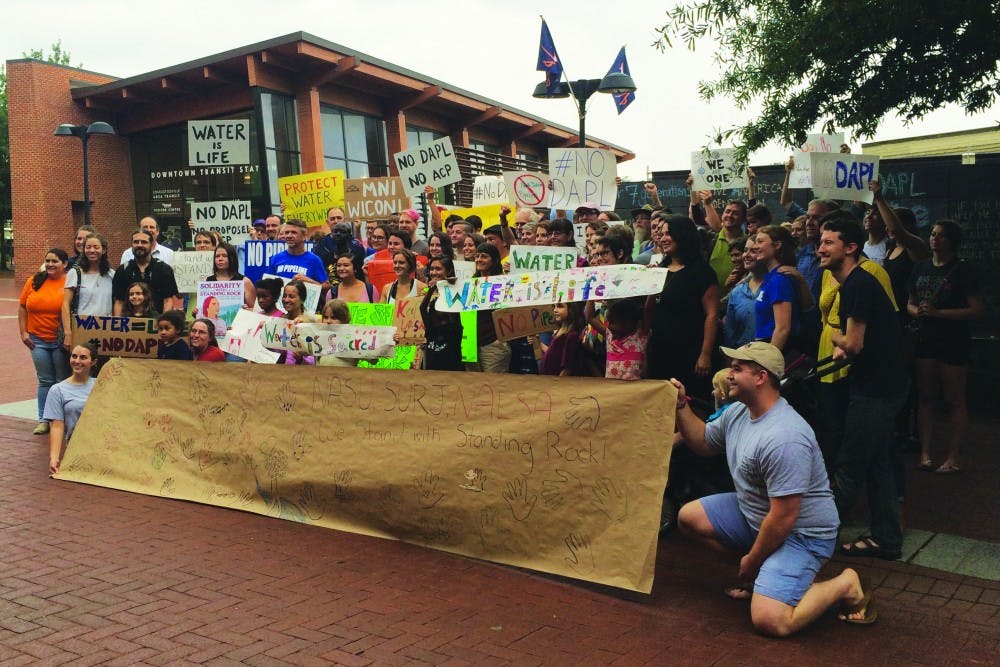University students and community members gathered at the downtown mall Wednesday to stand in solidarity with the Standing Rock Sioux tribe in an event organized by the Native American Student Union, Showing Up for Racial Justice Charlottesville and the Native American Law Students Association.
The tribe is currently locked in a legal battle with the U.S. Army Corps of Engineers over the construction of the Dakota Access Pipeline, a crude oil pipeline constructed by Energy Transfer Partners that runs within a half-mile of the Standing Rock Sioux reservation in South Dakota.
The pipeline itself runs from North Dakota to Illinois through South Dakota and Iowa. The tribe opposes its construction on the grounds that it is a threat to their water supply and to local cultural and religious resources.
Proponents of the pipeline argue its economic and safety benefits outweigh minimal environmental risks, and dispute that it trespasses land of any proven cultural significance.
“Multiple archaeological studies conducted with state historic preservation offices found no sacred items along the route,” Kelcy Warren, chairman and chief executive officer of ETP, said in an internal memo.
Approximately 65 people attended the protest, called NoDAPL. Evelyn Immonen, third-year College student and chief financial officer of NASU, organized the group into a circle and led a ritual sage burning in spite of the light rain.
Prior to the demonstration, Immonen said she was hopeful the gathering would lend visibility to the issue and provide supporters from different organizations and communities an opportunity to get to know each other.
“NASU wanted to focus on making this a peaceful protest, and kind of a prayerful protest too,” she said.
Demonstrators held up colorful banners and signs with slogans including, “Water Is Life,” “NoDAPL”, “I Stand with Standing Rock,” and “Mni Wiconi,” Lakota for “Water is Life”. Children and adults alike pressed painted palmprints into a paper banner reading, “NASU, SURJ, NALSA: We Stand with Standing Rock!”
Organizers and representatives from local tribes and environmental organizations took turns speaking.
Karenne Wood, of the Monacan Nation — a local tribe based in Amherst County — issued a statement of welcome to the protestors.
“Whenever we get a group of people gathered together, we like to welcome you to our homeland,” Wood said.
Pam Starsia represented SURJ Cville at the event, the local branch of a national organization that networks white people seeking racial justice.
“Our goal with SURJ at this event tonight is to emphasize the interrelatedness of the movement that is going on with the water protectors at Standing Rock and the movement for black liberation,” Starsia said.
She read a passage from a statement of solidarity with Standing Rock issued by the Black Lives Matter movement, linking Native American concerns over water pollution to chemical contamination in black communities like Flint, Mich.
“None of us are free until all of us are free,” she said.
David Sligh, conservation director of Wild Virginia — a local environmental advocacy group, emphasized the importance of outreach to halting the pipeline and expressed his disappointment in the governmental agencies which approved to it.
“We sent a letter to the Standing Rock Tribe expressing our solidarity and our support for their movement, and we all gotta make that heard — to the president, to our Congress, to the agencies, the government agencies who are supposed to work for us but too often work for the powerful and the money,” Sligh said.
Following a group picture, the group walked the length of the mall from the Free Speech Wall to the Omni Hotel chanting “Water is life!”
Before the event, NALSA President Brette Throckmorton, a Law student, said that the issue was of particular interest to Native American law students due to its legal implications.
“I think this is something that really resonates, particularly with Law students, just because of the unique aspects of the movement that deal with a current court case and the ongoing litigation,” said Throckmorton.
The Standing Rock Sioux lost an appeal for a Preliminary Injunction to immediately halt pipeline construction, but the Federal government has stepped in to request that construction not proceed within 20 miles of Lake Oahe.
They have filed a lawsuit against the U.S. Army Corps of Engineers, on the grounds of inadequate tribal consultation, but a decision has yet to be made in that case.
In response to request for comment, the USACE provided a joint statement from the Department of Justice, the Department of the Army and the Department of the Interior acknowledging the tribe’s concerns and requesting a halt to construction within 20 miles of Lake Oahe.
"The Army will not authorize constructing the Dakota Access pipeline on Corps land bordering or under Lake Oahe until it can determine whether it will need to reconsider any of its previous decisions regarding the Lake Oahe site under the National Environmental Policy Act or other federal laws,” the statement read.
The agencies behind the statement also proposed meetings with tribes to discuss reforms to tribal consultation practices and possible legislative reforms to support better practices.
"This case has highlighted the need for a serious discussion on whether there should be nationwide reform with respect to considering tribes’ views on these types of infrastructure projects,” they said.







